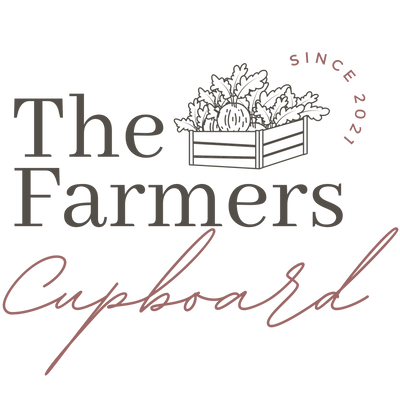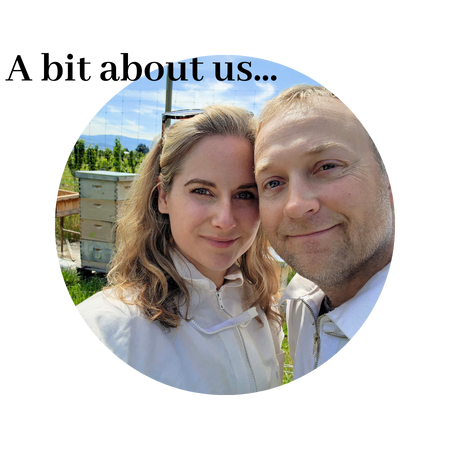If you have a home that has gorgeous wood features, such as floors, tables, chairs, banisters and railing, or maybe you love the art of chalk-style painting your furniture, (or perhaps you are refinishing furniture) you may be looking for a great natural beeswax furniture polish.
Did you know the best furniture polish for wood finishes is one that you can super easily DIY? It's true.
When you buy furniture polish, it is usually full of chemicals, preservatives and is a spray polish that often gets into the air and on other things that you may not want polished.

DIY Furniture Polish
When you make your own handmade, DIY beeswax furniture polish, it has two, chemical free, food grade ingredients that you can feel good about using on your wood such as oak, teak and other wood furniture.
My house was partially built in the 1940's but it still has most of the original wood flooring as well as many other old, bare wood pieces that I brought in myself.
I love farmhouse style and vintage furniture and décor. But to maintain it and keep it shiny, I made this easy beeswax furniture polish using the natural beeswax from our own backyard hives.
Not a beekeeper?? No problem, we are going to share some really great, reputable and natural beeswax sources for you so you can order online, below and take advantage of making your own polish.
Plus, there are so many other great uses for beeswax!
Let's get into making your own furniture polish using natural beeswax.

Beeswax For Furniture Polish
Let's talk about using natural beeswax supplies to bring out the natural beauty in your wood products. It is important when making wood polish to find a high quality, pure beeswax.
But, how do you know if the beeswax you are buying for your furniture is the real deal?
How To Find Real Beeswax
Now, you may not be a beekeeper and have access to your own beeswax furniture polish ingredients. Don't worry though, we have advice and resources for you.
In order to find this true, natural beeswax, you should first know:
- where it is coming from (the location)
- who is selling it (is it direct from a farmer or beekeepers)
- and if it is pure
If you can answer these three questions about beeswax you are thinking of purchasing, you are on your way to finding a true, 100% pure beeswax from a great source.
Read our article, Where To Buy Pure Beeswax Directly From Beekeepers 
Often, you will see beeswax advertised on big websites and a lot of the times, this can come from out of country where there are different standards, or they are adding other oils or waxes to have more product to sell.
When making wood beeswax furniture polish, you want to fine 100% pure, natural beeswax so your pieces shine.
Natural beeswax will act as a conditioner and will shine, polish and protect your wood and leave a very subtle, pleasant smell for a wax polish.
You certainly do not want to buy a beeswax product that has been mixed with another type of wax, or one that has been bleached or who knows what else.
Here is exactly what you need to know about purchasing pure beeswax from good sources.
1. Understand The Term "Organic" Beeswax
This is a term that most beekeepers cringe at. Why? Because it is nearly impossible to produce organic beeswax (and the same goes for honey!).
There are regulations on selling byproducts from honey bees, and to define your product as "organic", there is a certain criteria that is pretty much impossible to achieve.
Other countries may have different regulations in their labelling, but in the USA and Canada (I am assuming in Australia as well? Feel free to comment below with what the regulations are in your country, fellow beekeepers) to label your beeswax as "organic", everything in the range of where the honeybees fly has to be organic.
Honey bees can fly 2-3 miles from their hive in all directions. So every flower they pollinate and every blossom or tree they even touch would have to be "organic" in order for their honey and their beeswax to be organic.
Of course, maybe you know a beekeeper who lives totally isolated and owns the property around them for miles and miles; there are exceptions. But on average, you may want to go running when you see the words "organic" on your beeswax (or honey).
2. Beeswax Pellets, Bars or Block
So here, we are talking about the form that your beeswax comes in.
When you purchase beeswax directly from the beekeeper for your non toxic protective coating for wood surfaces, it will come in either block, bar or pellet form. Sometimes, the pellets are referred to as pastilles as well.
Small beekeeping operations will typically not have the time or the commercial capabilities to melt the wax, put them into the pastille molds, let them cool and harden and then take them out, filter them for size and then package them. Not if they are selling online. It just doesn't make sense in a time-money ratio for a small business.
Again, there are exceptions, and you can research a company about their process. We have done this research and know of a few beeswax companies who do that the time to make pellets with their own beeswax, so they do exist.
My point here, is that if the company is selling bulk pellets, I would assume they are a large company with processes and machinery and will likely be adding wax or other oils to compensate for quantity.
We are simply suggesting to research your beeswax provider.
For wood beeswax furniture polish, you are going to want to go for quality over quantity and look for small beekeeping operations that sell their pure beeswax.
You can purchase in blocks or bars and melt them down yourself in a wax melter, or if you want, you can use a cheese grater to grate the wax down and use it that way for easy measuring.
See the wax melter we recommend for melting pure beeswax right here
3. White Beeswax or Yellow Beeswax
As beekeepers, our wax has always naturally been deep yellow in color. This is important to note because the only thing we do to our beeswax is filter all of the extra remnants out after the melting process, such as bits of bees and any little solid pieces that might find their way into the wax. This is why the wax is always filtered after boiling.
After melting our wax down, we like to place it into a mold so it can harden. Many people find cute little molds for their wax, we simply like to keep ours in wax bars.
We have had different shades of yellow wax varying from dark to light to bright yellow beeswax, but we have never produced a white beeswax before. That is because our filters do not filter out the bee propolis and the pollen that gets mixed into the wax, which naturally make beeswax yellow. We also don't bleach our wax.
Honestly, I wouldn't want to filter any of those fantastic natural inclusions out. So between yellow and white beeswax for sale, we would personally go for the yellow.
How To Make Beeswax Furniture Polish
Here is the best recipe for wooden beeswax furniture polish (one that cleans wood and polishes it).
Beeswax furniture polish ingredients:
- 15g of real, pure beeswax
- 45g of food grade mineral oil
- 10-20 drops of lemon or orange (or any) essential oil (this is optional for added scent, add only if you prefer). Please use organic, real essential oil for this project.
*These are the essential oils we use, they are fantastic
We also recommend using a kitchen scale to weigh your ingredients.
Beeswax wood polish instructions:
- Grate the beeswax and place it in a double boiler or a heatproof bowl over a pot of simmering water.
- Once the beeswax has melted, add the turpentine or mineral spirits and the linseed or lemon oil (if using) and stir until well combined.
- Remove the mixture from heat and allow it to cool and thicken slightly.
- Once cooled, use a clean cloth to apply the polish to your furniture, working in the direction of the grain.
- Allow the polish to dry for at least 30 minutes before buffing with a clean, soft cloth to a shine.

How To Use Homemade Beeswax Furniture Polish
To use the beeswax wood furniture polish you have just made, follow these steps:
- Clean the surface of your wood furniture using a mild detergent or wood cleaner. Make sure to remove any dust, dirt or grime that may be on the surface.
- Once the wood is clean and dry, apply a small amount of your beeswax polish to a clean, soft cloth or a dense sponge to buff.
- Gently rub and buff the beeswax furniture polish in the direction of the grain, using a circular motion to work it in and help it shine.
- Continue to apply and rub in the beeswax furniture polish until you have covered the entire wood surface of the furniture.
- Allow the polish to dry on your surface for at least 30 minutes before buffing it to a shine with another clean, soft cloth.
It's important to note that the polish should be used sparingly, as too much can leave a sticky residue, but a bit will cover it perfectly and protects/polishes your furniture.
You will find after you use it for the first time you will know how much to use going forward from there, so we recommend using a very small amount the first time. You can always add more, and you can use this recipe for many years on your wood pieces.
It's also recommended to test a small surface area before applying to the whole piece of wood furniture, in case of any discoloration or unwanted results.

When To Re-polish?
You can reapply the polish to your tables, cabinets, cutting boards or whatever wood furniture you are polishing as needed to maintain the shine and protect the wood.
You can also make a small batch of this non toxic, natural polish and store it in a airtight container for future use! Isn't that great?
Here is a pro tip, what we have found works great, is going to Costco and getting a big box of white "shop rags". They are these great soft little washcloths that work beautifully for polishing wooden furniture!
What Else Can You Use Beeswax For?
Other than making beeswax furniture polish, beeswax is used for:
- lip balm and lipstick
- makeup
- beeswax wraps
- beeswax candles and candle making supplies
- DIY lotions
- handmade soaps
- cheese waxing
- hair care products
- mustache and beard wax
- for chalk-style paint finishing
- for diamond paintings
- in skin care products
- in many more homemade products
Here are some other articles you may be interested in reading:
Where To Purchase Raw Honeycomb from Beekeepers Online
BEST Ways To Use Beeswax At Home
Did you like this article?
❤️ Here's how you can support our blog:
My name is Linnea and I am a backyard gardening enthusiast! Along with my husband and our two kids (and chickens, ducks, bees and our little dog). Our hobby - growing our own food and making our meals from scratch. My blog, The Farmers Cupboard, is the website that blossomed from that passion. I love every second I spend sharing our hobby with like minded backyard growers.
It's easy to support my blog, and it is so appreciated. Please SHARE an article somewhere, pin a photo to your Pinterest board, follow on any of our social medias or sign up for our newsletter! That's it!
These little things help our blog grow and allow us to continue doing what we love: growing good food and sharing what we learn.
PINTEREST PASSIONATE? We're opening up our cupboard to you!
Click on the pin below made just for you. It will bring you right to my little Pinterest community, where I would love for you to FOLLOW The Farmers Cupboard and see all of our gardening and backyard dream ideas!
Let's grow good things together!












Hi Zacharia, there is so much to learn before you start the journey of beekeeping. Have a look through our other articles to get a grasp of beekeeping, and we would recommend grabbing some beekeeping books, try these ones here: https://amzn.to/3K9sHbo and then other than that, once you have done those, we recommend joining a local beekeepers group or classes which are offered in many places. Try checking your local Facebook page and searching online, those will be really great local resources for you to start. Best of luck!!
I want to be a Farmer in beekeeping pls help